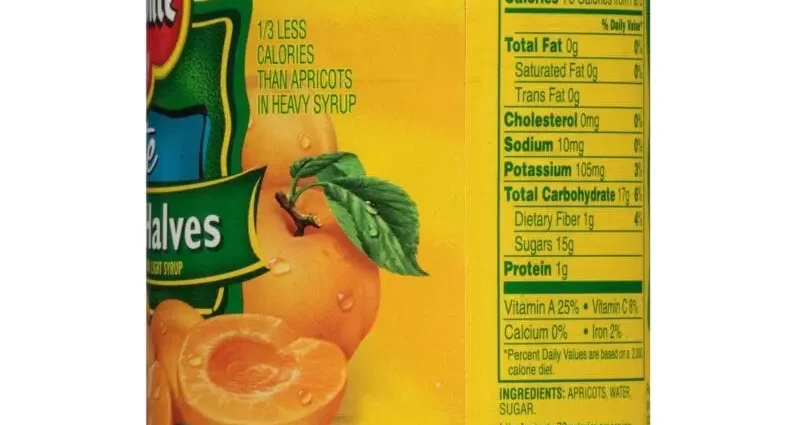Nutritional value and chemical composition.
The table shows the content of nutrients (calories, proteins, fats, carbohydrates, vitamins and minerals) per 100 grams edible part.
| Nutrient | Quantity | Norm** | % of the norm in 100 g | % of the norm in 100 kcal | 100% normal |
| Calorie value | 49 kCal | 1684 kCal | 2.9% | 5.9% | 3437 g |
| Proteins | 0.6 g | 76 g | 0.8% | 1.6% | 12667 g |
| Fats | 0.1 g | 56 g | 0.2% | 0.4% | 56000 g |
| Carbohydrates | 10.9 g | 219 g | 5% | 10.2% | 2009 g |
| Alimentary fiber | 1.6 g | 20 g | 8% | 16.3% | 1250 g |
| Water | 86.3 g | 2273 g | 3.8% | 7.8% | 2634 g |
| Ash | 0.5 g | ~ | |||
| Vitamins | |||||
| Vitamin A, RE | 64 μg | 900 μg | 7.1% | 14.5% | 1406 g |
| Vitamin B1, thiamine | 0.02 mg | 1.5 mg | 1.3% | 2.7% | 7500 g |
| Vitamin B2, riboflavin | 0.02 mg | 1.8 mg | 1.1% | 2.2% | 9000 g |
| Vitamin B5, pantothenic | 0.092 mg | 5 mg | 1.8% | 3.7% | 5435 g |
| Vitamin B6, pyridoxine | 0.054 mg | 2 mg | 2.7% | 5.5% | 3704 g |
| Vitamin B9, folate | 2 μg | 400 μg | 0.5% | 1% | 20000 g |
| Vitamin C, ascorbic | 4 mg | 90 mg | 4.4% | 9% | 2250 g |
| Vitamin PP, NE | 0.6 mg | 20 mg | 3% | 6.1% | 3333 g |
| Macronutrients | |||||
| Potassium, K | 140 mg | 2500 mg | 5.6% | 11.4% | 1786 g |
| Calcium, Ca | 10 mg | 1000 mg | 1% | 2% | 10000 g |
| Magnesium, Mg | 6 mg | 400 mg | 1.5% | 3.1% | 6667 g |
| Sodium, Na | 2 mg | 1300 mg | 0.2% | 0.4% | 65000 g |
| Sulfur, S | 6 mg | 1000 mg | 0.6% | 1.2% | 16667 g |
| Phosphorus, P | 12 mg | 800 mg | 1.5% | 3.1% | 6667 g |
| Trace Elements | |||||
| Iron, Fe | 0.3 mg | 18 mg | 1.7% | 3.5% | 6000 g |
| Manganese, Mn | 0.052 mg | 2 mg | 2.6% | 5.3% | 3846 g |
| Copper, Cu | 40 μg | 1000 μg | 4% | 8.2% | 2500 g |
| Zinc, Zn | 0.08 mg | 12 mg | 0.7% | 1.4% | 15000 g |
| Essential Amino Acids | |||||
| Arginine * | 0.023 g | ~ | |||
| valine | 0.022 g | ~ | |||
| Histidine * | 0.01 g | ~ | |||
| Isoleucine | 0.018 g | ~ | |||
| leucine | 0.035 g | ~ | |||
| lysine | 0.042 g | ~ | |||
| methionine | 0.003 g | ~ | |||
| threonine | 0.022 g | ~ | |||
| tryptophan | 0.011 g | ~ | |||
| phenylalanine | 0.025 g | ~ | |||
| Replaceable amino acids | |||||
| alanine | 0.03 g | ~ | |||
| Aspartic acid | 0.137 g | ~ | |||
| glycine | 0.019 g | ~ | |||
| Glutamic acid | 0.061 g | ~ | |||
| Proline | 0.036 g | ~ | |||
| serine | 0.034 g | ~ | |||
| tyrosine | 0.014 g | ~ | |||
| Cysteine | 0.002 g | ~ | |||
| Saturated fatty acids | |||||
| Saturated fatty acids | 0.007 g | max 18.7 г | |||
| 16: 0 Palmitic | 0.006 g | ~ | |||
| 18: 0 Stearin | 0.001 g | ~ | |||
| Monounsaturated fatty acids | 0.043 g | min 16.8 г | 0.3% | 0.6% | |
| 18: 1 Olein (omega-9) | 0.043 g | ~ | |||
| Polyunsaturated fatty acids | 0.02 g | from 11.2 to 20.6 | 0.2% | 0.4% | |
| 18: 2 Linoleic | 0.02 g | ~ | |||
| Omega-6 fatty acids | 0.02 g | from 4.7 to 16.8 | 0.4% | 0.8% |
The energy value is 49 kcal.
- cup, halves = 247 g (121 kCal)
Tags: calorie content 49 kcal, chemical composition, nutritional value, vitamins, minerals, what are the benefits of Apricots canned in extra light sugar syrup, calories, nutrients, useful properties Apricots canned in extra light sugar syrup










